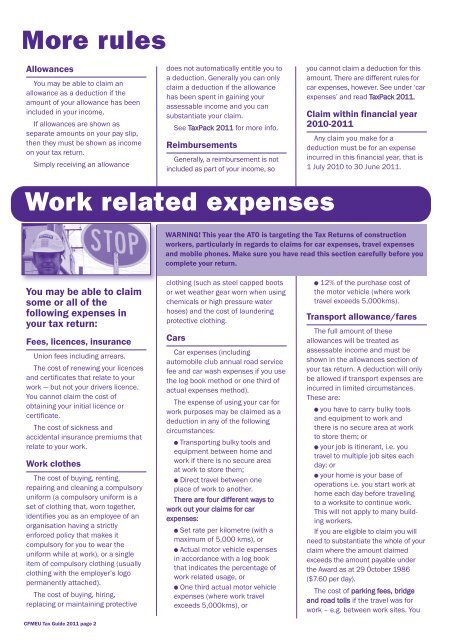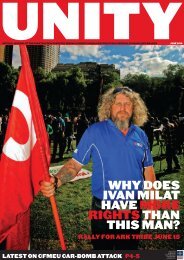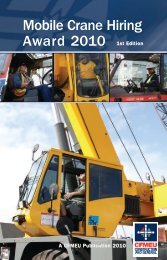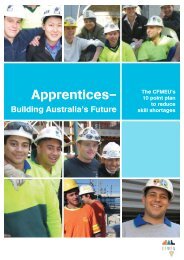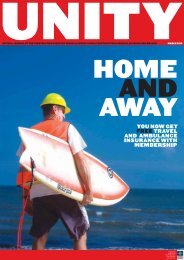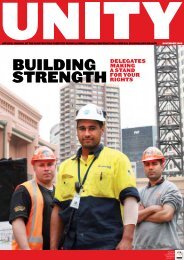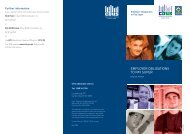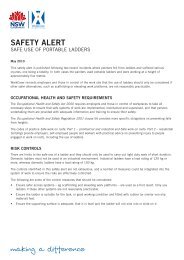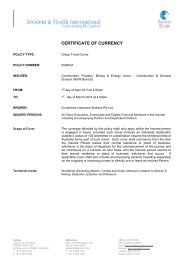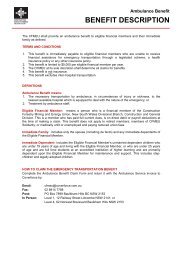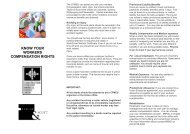Tax Guide 2011 - cfmeu
Tax Guide 2011 - cfmeu
Tax Guide 2011 - cfmeu
You also want an ePaper? Increase the reach of your titles
YUMPU automatically turns print PDFs into web optimized ePapers that Google loves.
More rules<br />
Allowances<br />
You may be able to claim an<br />
allowance as a deduction if the<br />
amount of your allowance has been<br />
included in your income.<br />
If allowances are shown as<br />
separate amounts on your pay slip,<br />
then they must be shown as income<br />
on your tax return.<br />
Simply receiving an allowance<br />
You may be able to claim<br />
some or all of the<br />
following expenses in<br />
your tax return:<br />
Fees, licences, insurance<br />
Union fees including arrears.<br />
The cost of renewing your licences<br />
and certificates that relate to your<br />
work — but not your drivers licence.<br />
You cannot claim the cost of<br />
obtaining your initial licence or<br />
certificate.<br />
The cost of sickness and<br />
accidental insurance premiums that<br />
relate to your work.<br />
Work clothes<br />
The cost of buying, renting,<br />
repairing and cleaning a compulsory<br />
uniform (a compulsory uniform is a<br />
set of clothing that, worn together,<br />
identifies you as an employee of an<br />
organisation having a strictly<br />
enforced policy that makes it<br />
compulsory for you to wear the<br />
uniform while at work), or a single<br />
item of compulsory clothing (usually<br />
clothing with the employer’s logo<br />
permanently attached).<br />
The cost of buying, hiring,<br />
replacing or maintaining protective<br />
CFMEU <strong>Tax</strong> <strong>Guide</strong> <strong>2011</strong> page 2<br />
does not automatically entitle you to<br />
a deduction. Generally you can only<br />
claim a deduction if the allowance<br />
has been spent in gaining your<br />
assessable income and you can<br />
substantiate your claim.<br />
See <strong>Tax</strong>Pack <strong>2011</strong> for more info.<br />
Reimbursements<br />
Generally, a reimbursement is not<br />
included as part of your income, so<br />
Work related expenses<br />
clothing (such as steel capped boots<br />
or wet weather gear worn when using<br />
chemicals or high pressure water<br />
hoses) and the cost of laundering<br />
protective clothing.<br />
Cars<br />
Car expenses (including<br />
automobile club annual road service<br />
fee and car wash expenses if you use<br />
the log book method or one third of<br />
actual expenses method).<br />
The expense of using your car for<br />
work purposes may be claimed as a<br />
deduction in any of the following<br />
circumstances:<br />
● Transporting bulky tools and<br />
equipment between home and<br />
work if there is no secure area<br />
at work to store them;<br />
● Direct travel between one<br />
place of work to another.<br />
There are four different ways to<br />
work out your claims for car<br />
expenses:<br />
● Set rate per kilometre (with a<br />
maximum of 5,000 kms), or<br />
● Actual motor vehicle expenses<br />
in accordance with a log book<br />
that indicates the percentage of<br />
work related usage, or<br />
● One third actual motor vehicle<br />
expenses (where work travel<br />
exceeds 5,000kms), or<br />
you cannot claim a deduction for this<br />
amount. There are different rules for<br />
car expenses, however. See under ‘car<br />
expenses’ and read <strong>Tax</strong>Pack <strong>2011</strong>.<br />
Claim within financial year<br />
2010-<strong>2011</strong><br />
Any claim you make for a<br />
deduction must be for an expense<br />
incurred in this financial year, that is<br />
1 July 2010 to 30 June <strong>2011</strong>.<br />
WARNING! This year the ATO is targeting the <strong>Tax</strong> Returns of construction<br />
workers, particularly in regards to claims for car expenses, travel expenses<br />
and mobile phones. Make sure you have read this section carefully before you<br />
complete your return.<br />
● 12% of the purchase cost of<br />
the motor vehicle (where work<br />
travel exceeds 5,000kms).<br />
Transport allowance/fares<br />
The full amount of these<br />
allowances will be treated as<br />
assessable income and must be<br />
shown in the allowances section of<br />
your tax return. A deduction will only<br />
be allowed if transport expenses are<br />
incurred in limited circumstances.<br />
These are:<br />
● you have to carry bulky tools<br />
and equipment to work and<br />
there is no secure area at work<br />
to store them; or<br />
● your job is itinerant, i.e. you<br />
travel to multiple job sites each<br />
day; or<br />
● your home is your base of<br />
operations i.e. you start work at<br />
home each day before traveling<br />
to a worksite to continue work.<br />
This will not apply to many building<br />
workers.<br />
If you are eligible to claim you will<br />
need to substantiate the whole of your<br />
claim where the amount claimed<br />
exceeds the amount payable under<br />
the Award as at 29 October 1986<br />
($7.60 per day).<br />
The cost of parking fees, bridge<br />
and road tolls if the travel was for<br />
work – e.g. between work sites. You


